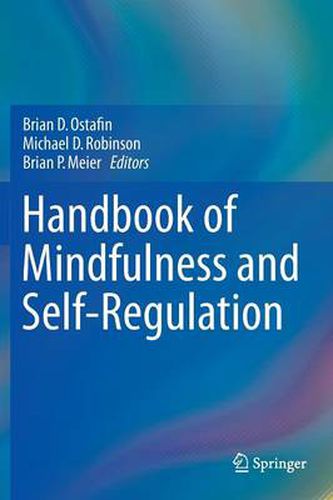Readings Newsletter
Become a Readings Member to make your shopping experience even easier.
Sign in or sign up for free!
You’re not far away from qualifying for FREE standard shipping within Australia
You’ve qualified for FREE standard shipping within Australia
The cart is loading…






This title is printed to order. This book may have been self-published. If so, we cannot guarantee the quality of the content. In the main most books will have gone through the editing process however some may not. We therefore suggest that you be aware of this before ordering this book. If in doubt check either the author or publisher’s details as we are unable to accept any returns unless they are faulty. Please contact us if you have any questions.
This empirically robust resource examines multiple ways mindfulness can be harnessed to support self-regulation, in part as a real-world component of therapy. Its authoritative coverage approaches complex mind/brain connections from neuroscience, cognitive, personality, social, clinical, and Buddhist perspectives, both within and outside traditional meditation practice. In domains such as letting go of harmful habits and addictions, dealing with depression and anxiety, regulating emotions, and training cognitive function, contributors show how mindfulness-based interventions encourage and inspire change. In addition to scientific coverage, experts translate their methods and findings on mindfulness mechanisms in terms that are accessible to students and clinicians.
Included in the Handbook:
Mindfulness and its role in overcoming automatic mental processes Burning issues in dispositional mindfulness research Self-compassion: what it is, what it does, and how it relates to mindfulness Mindfulness-based cognitive therapy and mood disorders Mindfulness as a general ingredient of successful psychotherapy The emperor’s clothes: a look behind the Western mindfulness mystique
Heralding a new era of mind/brain research–and deftly explaining our enduring fascination with mindfulness in the process–the Handbook of Mindfulness and Self-Regulation will enhance the work of scholars and practitioners.
$9.00 standard shipping within Australia
FREE standard shipping within Australia for orders over $100.00
Express & International shipping calculated at checkout
This title is printed to order. This book may have been self-published. If so, we cannot guarantee the quality of the content. In the main most books will have gone through the editing process however some may not. We therefore suggest that you be aware of this before ordering this book. If in doubt check either the author or publisher’s details as we are unable to accept any returns unless they are faulty. Please contact us if you have any questions.
This empirically robust resource examines multiple ways mindfulness can be harnessed to support self-regulation, in part as a real-world component of therapy. Its authoritative coverage approaches complex mind/brain connections from neuroscience, cognitive, personality, social, clinical, and Buddhist perspectives, both within and outside traditional meditation practice. In domains such as letting go of harmful habits and addictions, dealing with depression and anxiety, regulating emotions, and training cognitive function, contributors show how mindfulness-based interventions encourage and inspire change. In addition to scientific coverage, experts translate their methods and findings on mindfulness mechanisms in terms that are accessible to students and clinicians.
Included in the Handbook:
Mindfulness and its role in overcoming automatic mental processes Burning issues in dispositional mindfulness research Self-compassion: what it is, what it does, and how it relates to mindfulness Mindfulness-based cognitive therapy and mood disorders Mindfulness as a general ingredient of successful psychotherapy The emperor’s clothes: a look behind the Western mindfulness mystique
Heralding a new era of mind/brain research–and deftly explaining our enduring fascination with mindfulness in the process–the Handbook of Mindfulness and Self-Regulation will enhance the work of scholars and practitioners.